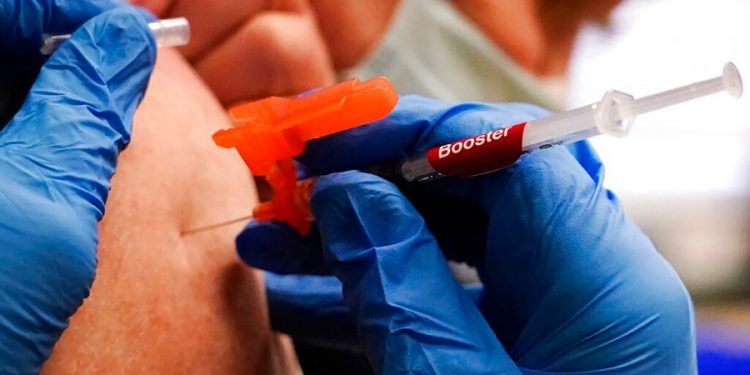Happy anniversary to one of the coolest moments in baseball history: 27 years ago today, Cal Ripken Jr. broke Lou Gehrig’s record for consecutive games played.
In health news, the White House is planning COVID-19 boosters to be an annual event, like flu shots.
Welcome to Overnight Health Care, where we’re following the latest moves on policy and news affecting your health. For The Hill, we’re Nathaniel Weixel and Joseph Choi. Someone forward you this newsletter? Subscribe here.
White House: Public will need annual boosters
Top White House health officials indicated Tuesday that the public is likely to need annual COVID-19 booster shots, making this year’s updated booster similar to an annual flu shot.
“It is becoming increasingly clear that, looking forward with the COVID-19 pandemic, in the absence of a dramatically different variant, we likely are moving towards a path of vaccination cadence similar to that of the annual influenza vaccine, with annual updated COVID-19 shots matched to the currently circulating strains for most of the population,” Anthony Fauci, the country’s top infectious diseases doctor, said during a briefing.
Selling point: The messaging from the White House is an attempt to sell the public on the benefits of the variant-specific booster dose that was authorized last week.
Barring any “variant curveballs,” White House coronavirus response coordinator Ashish Jha said he expects new boosters “will provide better protection against infection, better protection against transmission and ongoing and better protection against serious illness.”
Mixed signals? Administration officials say the new vaccines will be key to controlling a potential fall surge, but they will need to convince an increasingly checked-out public to get the shots. Demand for vaccines has waned with each subsequent booster campaign.
The White House is simultaneously projecting that COVID-19 is now a disease that is a part of everyday life while also urging people to be vaccinated.
Read more here.
Feds stress need for new COVID funding
The boosters will be free, but there’s no money for much more.
White House officials on Tuesday reiterated calls for new COVID-19 response funding to be approved by Congress as the fall vaccination campaign begins, with officials warning that there are currently not enough resources to respond should a new surge emerge.
White House officials like COVID-19 response coordinator Ashish Jha and Health and Human Services Secretary Xavier Becerra warned about the consequences of Congress failing to allocate more money.
“Congress is aware that if we do not continue to fund the response, things … can easily go backwards,” Jha said.
Becerra, however, remained vague on whether there are enough updated vaccine doses available for whoever wants one when asked about the lack of new funding. The White House previously warned that additional boosters and variant-specific vaccines would not be available for everyone if new funding was not approved by Congress.
The wells run dry: The White House cut funds from other areas of the COVID-19 response earlier this year in order to continually fund treatments and vaccines.
Becerra said the possibility of going into the fall and winter without vaccines for Americans was “unacceptable.”
“We will not have tests in our Strategic National Stockpile should we see another omicron like event,” Becerra said. “We had promised the American people we would make sure that we did not get into that, but we needed Congress to step up. Congress has not stepped up.”
Read more here.
JUUL TO SETTLE YOUTH VAPING INVESTIGATION FOR $438 MILLION
E-cigarette company Juul on Tuesday tentatively agreed to pay $438.5 million to settle an investigation by 34 states and territories into the company’s marketing and sales practices that were alleged to fuel the youth vaping crisis.
The investigation found the company deliberately engaged in an advertising campaign that appealed to youth with launch parties, advertisements using young and trendy-looking models, social media posts, and free samples.
The settlement would severely limit Juul’s marketing and sales practices. It would prohibit Juul from marketing to youth and from funding education programs in schools.
Nobody under the age of 35 would be depicted in any of the company’s marketing materials, and the company would be prohibited from misrepresenting the level of nicotine in its products.
Read more here.
HOW LONG COVID IS AFFECTING THE NATIONWIDE LABOR SHORTAGE
Persistent COVID-19 symptoms could be keeping millions of Americans out of the workforce.
Economists and policymakers have struggled to figure out why a much lower percentage of working-age adults are in the labor force than before the pandemic.
The number of Americans either employed or looking for work eclipsed its pre-pandemic level in August, according to Labor Department data released Friday. But the labor force participation rate remains 1 percentage point below its February 2020 level, a gap roughly equivalent to 1.6 million people.
“We don’t know what proportion of people are having very debilitating symptoms with a lot of certainty,” said Julia Raifman, an assistant professor at Boston University’s School of Public Health.
“But we know that it is happening to some people and we know that each infection seems to increase the chances of it happening,” she continued.
Roughly 16 million working-age Americans said they had long COVID in a June survey conducted by the Census Bureau, but it’s unclear how many of them are still too sick to work.
Read more here.
Biden officials award $20M monkeypox contract
The Department of Health and Human Services (HHS) on Tuesday announced it was awarding a nearly $20 million contract to AmerisourceBergen to expand the distributions of treatments and vaccines to treat the ongoing monkeypox outbreak.
The $19.8 million contract to AmerisourceBergen, one of the largest drug distribution companies in the U.S., will allow for the shipment of up to
2,500 shipments of frozen Jynneos vaccine vials as well 2,500 “ambient temperature” shipments of the TPOXX antiviral treatment per week.
This will also allow for more locations where the shipments can be received. HHS noted that before this contract, the U.S. Strategic National Stockpile was sending products to roughly five locations per jurisdiction.
Throughout the monkeypox outbreak, state and local governments have repeatedly said they have struggled to acquire the adequate amount of vaccines to immunize their at-risk populations. Shortly after first doses of Jynneos were administered around the country, several cities ended up delaying the second dose in order to meet immediate demand while hoping more vaccine doses would soon become available.
The response by numbers: HHS said about 800,000 vials of Jynneos and 37,000 courses of TPOXX have been distributed across the country so far. As of last week, over 352,000 doses of vaccines to treat monkeypox have been administered.
No deaths directly caused by monkeypox have been confirmed so far, though one man in Texas who was “severely immunocompromised” recently died after having been diagnosed with monkeypox.
Read more here.
WHAT WE’RE READING
Pfizer isn’t sharing Covid vaccines with researchers for next-gen studies (Stat)
In sprint to November, Democrats seize on shifting landscape over abortion (Washington Post)
To mask, or not to mask: theaters and concert halls face a dilemma (New York Times)
STATE BY STATE
When does life begin? As state laws define it, science, politics, and religion clash (Kaiser Health News)
New data shows thousands of transgender Medicaid recipients sought care in Florida (Politico)
Rape, incest exceptions out of South Carolina abortion bill (Associated Press)
That’s it for today, thanks for reading. Check out The Hill’s Health Care page for the latest news and coverage. See you tomorrow.
VIEW FULL VERSION HERE














